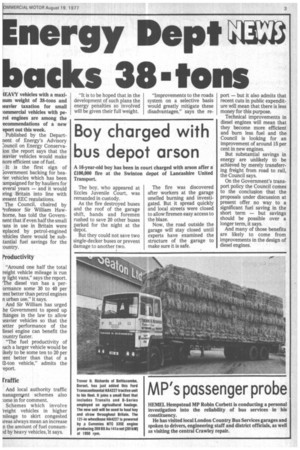E nergy Dept
Page 5

If you've noticed an error in this article please click here to report it so we can fix it.
backs 38-tons
-WAVY vehicles with a maxinum weight of 38-tons and wavier taxation for small lommercial vehicles with perol engines are among the ecommendations of a new eport out this week.
Published by the Departnent of Energy's Advisory ouncil on Energy Conservaion the report says that the wavier vehicles would make nore efficient use of fuel.
It is the first sign of Iovernment backing for hearier vehicles which has been :ampaigned for by hauliers for .everal years — and it would wing Britain into line with wesent EEC regulations.
The Council, chaired by ,rofessor Sir William Hawhome, has told the Governnent that if even half the small tans in use in Britain were eplaced by petrol-engin ed rehicles there would be subtantial fuel savings for the :ountry.
Productivity
"Around one half the total reight vehicle mileage is run iy light vans," says the report. The diesel van has a perormance some 30 to 40 per ;ent better than petrol engines n urban use," it says.
And Sir William has urged he Government to speed up thanges in the law to allow ieavier vehicles so that the )etter performance of the iiesel engine can benefit the ;ountry faster.
"The fuel productivity of ;uch a larger vehicle would be ikely to be some ten to 20 per ;ent better than that of a i2-ton vehicle," admits the -eport.
['raffle
And local authority traffic nanagenient schemes also ;ome in for comment.
Schemes which involve 'reight vehicles in higher nileage to skirt congested ireas always mean an increase n the amOunt of fuel consumNi by heavy vehicles, it says. "It is to be hoped that in the development of such plans the energy penalties so involved will be given their full weight. "Improvements to the roads system on a selective basis would greatly mitigate these disadvantages," says the re port — but it also admits that recent cuts in public expenditure will mean that there is less money for this purpose.
Technical improvements in diesel engines will mean that they become more efficient and burn less fuel and the Council is looking for an improvement of around 15 per cent in new engines.
But substantial savings in energy are unlikely to be achieved by merely transferring freight from road to rail, the Council says.
On the Government's transport policy the Council comes to the conclusion that the proposals under discussion at present offer no way to a significant fuel saving in the short term — but savings should be possible over a longer term, it says.
And many of those benefits are likely to come from improvements in the design of diesel engines.




































































































